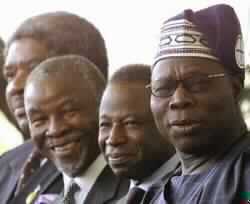HIGHLIGHTS: Annan Warns Leaders of Complacency||Unlike OAU, AU Will Have Right to Intervene in Cases of War Crimes||However, Zimbabwe Excluded From Agenda|| STORY: African leaders buried their Organization of African Unity (OAU) Monday but were warned against complacency by United Nations chief Kofi Annans they prepared to set up the ambitious African Union. (Read photo caption)
At least 40 presidents and monarchs opened a two-day summit by listening to a call from Libyan leader Muammar Gaddafi for more economic and political integration under the African Union (AU) that they will create on Tuesday.
Unlike the OAU, the AU will have the right to intervene in member states in cases of war crimes.
CONFLICTS WILL HAVE TO BE RESOLVED NOT SIMPLY MANAGED
The U.N. Secretary-General, born in the West African state of Ghana, told leaders that Africa's vast size, economic under-development, debt and legacy of war meant it would be much tougher to build the AU than it was to build the European Union.
Skepticism abounds, even among delegates in Durban, about the chances of the AU turning Africa into a haven of peace.
Despite progress in ending long-running wars in Sierra Leone and Angola, belligerents from Liberia to Sudan, passing through both Congos and the Great Lakes region, are still playing havoc.
Speakers in Durban pledged to strengthen democracy but the political and economic crisis in Zimbabwe was not on the agenda.
President Robert Mugabe was in the audience. An ex-guerrilla in office since 1980, after defeating white minority rule, he was declared winner of violent elections in March.
President Thabo Mbeki of South Africa, the summit host and one of three leaders who had Zimbabwe suspended from the Commonwealth after the polls, made no mention of Zimbabwe when he referred to successful recent African elections.
"These successes demonstrate that those who characterize ours as a hopeless continent are wrong," Mbeki said.
"As with many other things African, from the very beginnings of its life the OAU was dismissed by our detractors as an organization that was destined to fail," he said, calling the change from OAU to AU an evolution, not a death.
MANDELA THE MEDIATOR
Durban police, on top alert, said they blew up a suspicious parcel early Monday, about 500 meters (yards) from the venue.
"It was found that there was nothing in it...it looked like a bag," police spokesman Vish Naidoo said.
Towering statesman Nelson Mandela, who turns 84 next week, walked stiffly into the gathering, aided by a cane and by his wife Graca.
When the OAU was born in 1963, Mandela was starting 27 years in South African prisons. After the long struggle against
white rule, Mandela was the country's first democratically elected president until 1999. Now he spends most of his time mediating in African and domestic conflicts.
His successor, Mbeki, will be formally elected the last chairman of the OAU and then elected the first chairman of the AU. The 53-nation membership is unchanged.
Libya's Gaddafi claims parentage of the AU idea to strengthen African economic integration and the quality of its political governance.
"Africa has regained its self-esteem. They made us slaves, they called us inferior but we have regained our African name and culture," the purple-robed Gaddafi told the summit.
In power since a 1969 coup, Gaddafi is one of a diminishing number of African leaders who came to office unconstitutionally and who brook little if any domestic dissent.
Diplomatic sources said Gaddafi had gained inclusion on Sunday into a key committee steering NEPAD, a detailed recovery manifesto which analysts have dubbed the AU's "marketing arm."
The committee membership was raised from 15 countries to 20, also recruiting Kenya's President Daniel arap Moi who has held power since 1978 and whose government is often pilloried by foreign donors as corrupt and undemocratic.
After lunch the leaders met behind closed door to discuss the formation of a Peace and Security Council that will comprise 15 African countries and will have powers to deal with conflict and security issues under AU auspices.
PHOTO CAPTION
Zambian President Levy Mwanawasa, South African President Thabo Mbeki, Secretary General of the OAU Amara Essy and Nigerian President Olusegun Obasanjo, pose at the International Conference Center in Durban, July 8, 2002. At least 34 presidents and monarchs are at the two-day summit at which they will mark the birth of a new African Union (AU) whose mission is to combat poverty, conflict and corruption. (Juda Ngwenya/Reuters)
- Author:
News Agencies - Section:
WORLD HEADLINES


 Home
Home Discover Islam
Discover Islam Quran Recitations
Quran Recitations Lectures
Lectures
 Fatwa
Fatwa Articles
Articles Fiqh
Fiqh E-Books
E-Books Boys & Girls
Boys & Girls  Ramadan
Ramadan Fatwa Audios
Fatwa Audios Month of Mercy
Month of Mercy Women
Women Eed Al- Fitr
Eed Al- Fitr Food Recipes
Food Recipes Videos
Videos

 Prayer Times
Prayer Times












